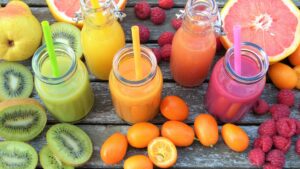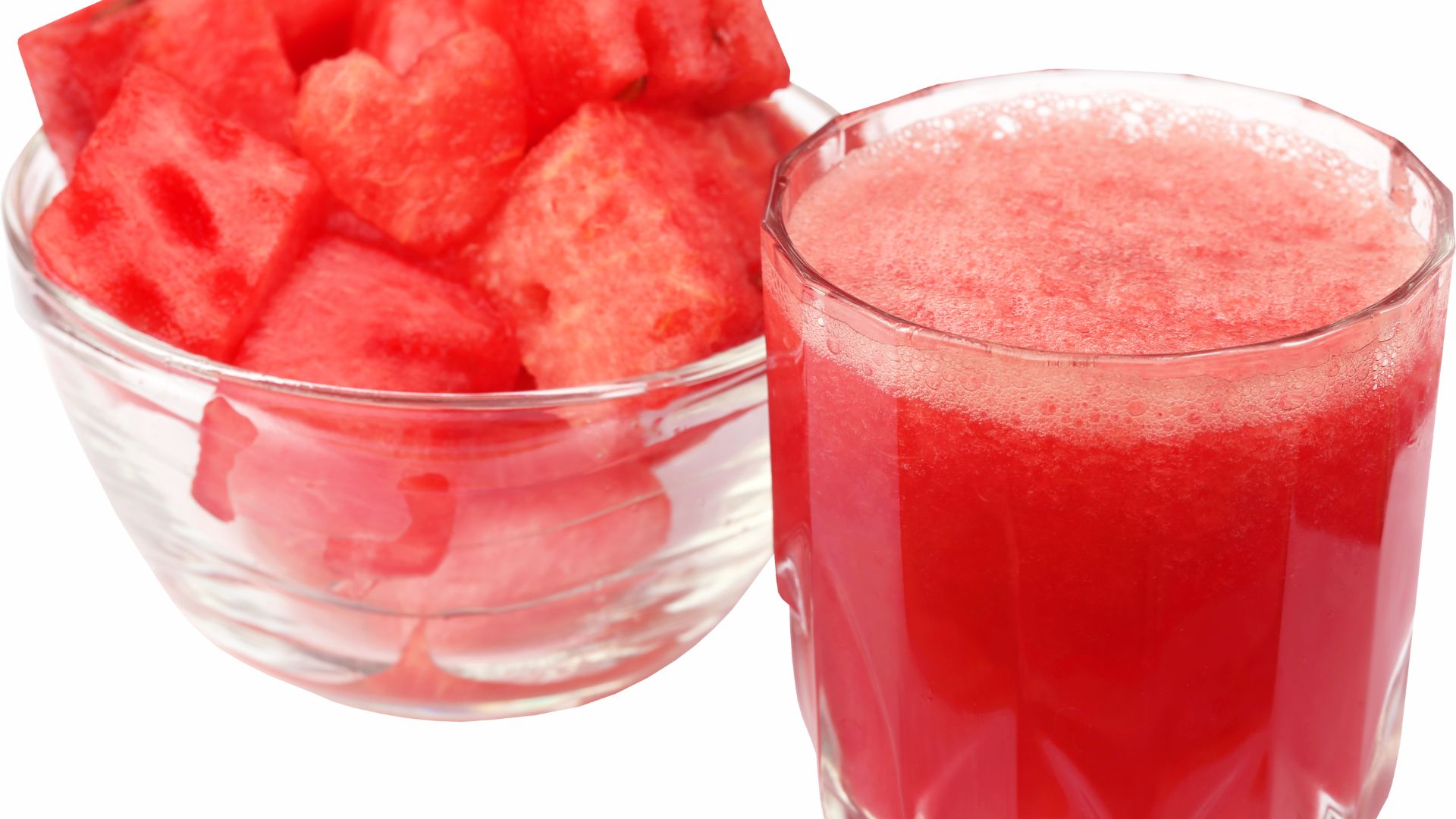Hey there, fitness enthusiasts! We’ve all been there in those satisfying yet challenging squat sessions that leave us feeling accomplished and a bit fatigued.
But have you ever wondered what’s the best way to rehydrate afterward? In this blog post, we’ll dive into the age-old debate: Should you reach for a refreshing glass of juice or stick to the good ol’ H2O? Let’s settle this post-squat thirst dilemma once and for all!
Understanding if to drink juice or water after squats and why.
After doing squats, it’s important to stay hydrated, but the choice between juice and water depends on your specific goals and preferences.
Here are some factors to consider:
Hydration: Water is the best choice for staying hydrated. It helps regulate your body temperature and aids in recovery. It’s essential to drink water before, during, and after your workout.
Calories and Sugar: Juice, especially fruit juice, contains calories and sugars that water doesn’t have.
If you’re looking to maintain or lose weight, water is the better choice as it won’t add unnecessary calories to your diet.
However, if you’re engaging in a very intense workout and need quick energy, a small glass of juice might be okay in moderation.
Electrolytes: If you’re doing an exceptionally intense workout or sweating a lot, you might consider a sports drink or an electrolyte-infused water.
These beverages can help replace lost electrolytes like sodium and potassium. However, for most people, water is sufficient for rehydration after squats.
Digestibility: Water is easily absorbed by the body, making it the quickest way to rehydrate. Juice, on the other hand, contains fiber and sugars that can slow down absorption. If you want a fast recovery, stick with water.
In essence, for most people, especially if your goal is general fitness or weight management, drinking water after squats is the best choice.
It helps with hydration, recovery, and it’s calorie-free. However, if you’ve had an exceptionally intense workout and need a quick energy boost, a small amount of juice might be acceptable, but avoid excessive consumption due to its sugar content.

Further Explanations.
Let’s delve deeper, let me explain these points mentioned further.
Hydration.
Hydration is crucial for various physiological functions in the body, especially during and after exercise.
Here’s an explanation of why water is the best choice for staying hydrated and why it plays a significant role in regulating body temperature and aiding in recovery:
Body Temperature Regulation:
When you exercise, your muscles generate heat, causing your body temperature to rise. This is a natural response to physical activity.
To maintain optimal performance and prevent overheating, your body relies on a process called thermoregulation. Sweating is a key component of this process. When you sweat, moisture evaporates from your skin, taking heat with it and helping to cool your body.
Dehydration impairs your body’s ability to sweat effectively, which can lead to overheating, heat exhaustion, or even heat stroke, especially in hot and humid conditions. Adequate hydration supports efficient sweating and helps your body stay within a safe temperature range during exercise.
Muscle Function and Recovery:
Muscles require proper hydration to function optimally. When you’re dehydrated, your muscle cells can’t contract and relax as efficiently, leading to decreased strength, endurance, and overall performance.
Hydration is vital for the transport of nutrients and oxygen to muscle cells. This is essential for energy production and muscle repair during and after exercise.
After intense physical activity like squats, your muscles may experience micro-tears and inflammation. Adequate hydration helps flush out waste products and provides the necessary fluids for the repair and recovery process.
Electrolyte Balance:
Water is essential for maintaining the balance of electrolytes in your body, such as sodium, potassium, calcium, and magnesium.
Electrolytes are crucial for muscle contractions, nerve impulses, and maintaining fluid balance in and around cells.
Sweating during exercise results in the loss of electrolytes. Rehydrating with water helps restore this balance, preventing muscle cramps and ensuring proper nerve and muscle function.
Overall Health:
Proper hydration is not only essential for exercise but also for overall health. Water is involved in digestion, circulation, and the elimination of waste products from the body.
Dehydration can lead to various health issues, including headaches, dizziness, and reduced cognitive function, which can negatively impact your workout and recovery.
In other words, water is the optimal choice for staying hydrated before, during, and after exercise because it supports body temperature regulation, muscle function, nutrient transport, and overall health.
It plays a crucial role in helping you perform your best during workouts and recover effectively afterward. It’s important to drink water consistently throughout the day, not just during exercise, to maintain proper hydration levels.
Calories and Sugar.
The consideration of calories and sugar when choosing between juice and water after a workout is tied to your specific fitness goals, energy needs, and the intensity of your exercise. Let’s explore this in more detail:
Calories and Weight Management:
Water is calorie-free, meaning it provides hydration without adding any additional calories to your diet.
If your primary fitness goal is to maintain or lose weight, choosing water over juice is generally the better option.
Weight management depends on the balance between the calories you consume and the calories you burn through physical activity.
Consuming calorie-free water helps you control your calorie intake, making it easier to maintain a calorie deficit if weight loss is your goal.
Sugar Content in Juice:
Fruit juices, even when 100% natural and not from concentrate, contain naturally occurring sugars from the fruits themselves. These sugars can add up quickly, especially in larger servings of juice.
Consuming excess sugar can lead to spikes in blood sugar levels, followed by crashes, which may leave you feeling tired or fatigued after your workout. It can also contribute to weight gain when consumed in excess.
Quick Energy Needs:
There are scenarios where a small glass of juice might be beneficial after an intense workout:
High-Intensity Workouts:
If you’ve engaged in a very strenuous and prolonged workout, such as endurance training or high-intensity interval training (HIIT), you may have depleted your glycogen stores (the body’s energy reserves). In such cases, a small glass of juice can provide a quick source of carbohydrates (sugars) to replenish glycogen levels and aid in recovery.
Low Blood Sugar:
If you experience symptoms of low blood sugar (hypoglycemia) after a demanding workout, a small amount of juice can help raise your blood sugar levels and provide rapid energy.
However, it’s important to emphasize moderation when consuming juice for quick energy, as excessive sugar intake can have negative health implications.
In all this, the choice between water and juice after squats or any workout should align with your fitness goals. If you’re looking to manage your weight or control calorie intake, water is the better choice.
If you’ve just completed an exceptionally intense workout and need quick energy, a small amount of juice (in moderation) may be appropriate.
Always consider your overall dietary habits and fitness goals when making this decision, and consult with a healthcare or nutrition professional if you have specific dietary concerns.
Electrolytes.
The consideration of electrolytes when choosing between water, sports drinks, or electrolyte-infused water after an intense workout, such as squats, depends on the intensity of your exercise, your sweat rate, and individual needs. Let’s break this down:

Electrolytes and Exercise:
Electrolytes are minerals such as sodium, potassium, calcium, and magnesium that play vital roles in various bodily functions, including muscle contractions, nerve signaling, and maintaining fluid balance.
During intense exercise, especially in hot and humid conditions, you can lose significant amounts of electrolytes through sweat. This can lead to imbalances that affect your performance and overall well-being.
Sports Drinks and Electrolyte-Infused Water:
Sports drinks are designed to replenish both fluids and electrolytes. They typically contain a mix of water, sugars, and electrolytes, making them suitable for athletes engaged in prolonged and vigorous exercise.
Electrolyte-infused water is plain water with added electrolytes, providing a more diluted source of electrolyte replenishment compared to sports drinks.
When to Consider Sports Drinks or Electrolyte-Infused Water:
Intense or Prolonged Workouts: If you’re participating in an exceptionally intense or prolonged workout, especially one lasting over an hour or involving endurance activities like long-distance running or cycling, you’re more likely to lose a significant amount of electrolytes. In such cases, a sports drink or electrolyte-infused water can help maintain electrolyte balance.
Excessive Sweating:
Some individuals naturally sweat more than others. If you’re a heavy sweater or exercising in a hot and humid environment, you may benefit from electrolyte replenishment.
Water for Most People:
For the average person engaging in moderate to high-intensity workouts, especially those of shorter duration, plain water is generally sufficient for rehydration.
Water helps replace lost fluids and is essential for the body’s natural cooling mechanism through sweating.
If you maintain a balanced diet with an adequate intake of fruits, vegetables, and other foods, you likely obtain a reasonable amount of electrolytes from your diet, making the additional electrolytes in sports drinks less necessary for short and moderate workouts.
In summary, while sports drinks and electrolyte-infused water have their place in rehydration strategies, they are not typically required for most people after squats or similar workouts.
Water is usually sufficient for rehydration, especially for workouts of moderate intensity and duration.
However, for exceptionally intense or prolonged exercise sessions, or if you’re prone to heavy sweating, you may consider using these specialized beverages to help maintain electrolyte balance.
As always, individual hydration needs can vary, so it’s essential to listen to your body and adjust your fluid intake accordingly.
Digestibility.
The concept of digestibility plays a significant role in understanding why water is absorbed more quickly by the body for rehydration compared to juice, especially when it comes to post-workout recovery. Here’s an explanation of why water is the quicker option:
Water Absorption:
Water is a simple molecule composed of two hydrogen atoms and one oxygen atom (H2O). Because of its simplicity, water can be rapidly absorbed by the body.
The absorption of water primarily occurs in the small intestine, where it moves directly into the bloodstream.
This process is facilitated by osmosis, a passive transport mechanism that allows water to move across cell membranes and into cells as needed.
Juice and Digestibility:
Juice, especially fruit juice, contains not only water but also complex molecules like sugars and sometimes fiber. These additional components affect its digestibility and absorption rate.
Sugars in juice, such as fructose and glucose, need to be broken down and processed by the digestive system before they can be absorbed into the bloodstream. This involves enzymes and transporters in the gut.
Fiber, present in some juices, can slow down the absorption of sugars. Fiber is not digested by the body but instead adds bulk to the contents of the digestive tract, which can lead to slower absorption of the sugars in the juice.
Fast Recovery and Hydration:
After intense exercise like squats, the body’s priority is to replenish fluids and electrolytes as quickly as possible to support recovery.
Water is the quickest way to achieve this because it doesn’t require the digestive system to break down complex molecules. It is rapidly absorbed and readily available for rehydration.
Juice, with its sugars and sometimes fiber, may take longer to be absorbed and utilized by the body, potentially delaying the process of rehydration and recovery.
In summary, for fast recovery and immediate rehydration after squats or other workouts, water is the preferred choice because it is easily and quickly absorbed by the body.
Juice, due to its additional components like sugars and fiber, may not be as efficient for rapid rehydration.
While juice can be a source of hydration and nutrients, especially when consumed as part of a balanced diet, it may not be the optimal choice for immediate post-exercise recovery when speed of rehydration is essential.
A tabular on this topic here.
Here’s a simple tabular comparison of drinking juice vs. water after squats based on various factors:
| Factor | Juice | Water |
|---|---|---|
| Hydration | Provides hydration but may not be as efficient as water due to added sugars and potential slower absorption. | Highly efficient for immediate hydration due to rapid absorption. |
| Calories and Sugar | Contains calories and natural sugars. Not ideal if you’re looking to manage weight or control calorie intake. | Calorie-free and does not contribute to weight gain. |
| Electrolytes | May contain some electrolytes, but the levels can vary. | Generally does not contain significant electrolytes. |
| Digestibility | Contains sugars and, in some cases, fiber, which can slow down absorption. | Easily and quickly absorbed by the body. |
| Quick Energy (if needed) | Can provide a quick source of energy due to sugar content. | Does not provide a quick source of energy but supports hydration and recovery. |
| General Recommendation | Suitable for intense workouts with high energy demands but should be consumed in moderation due to sugar content. | Recommended for most people for efficient and immediate rehydration. |
Please note that the choice between juice and water after squats may also depend on individual preferences, dietary considerations, and specific fitness goals. Always consider your unique needs and consult with a healthcare or nutrition professional if you have specific concerns about post-workout hydration and nutrition.
Conclusion.
In conclusion, for most individuals after squats, water is the preferred choice for post-workout hydration.
It offers quick and efficient rehydration without added calories, sugars, or potential digestion delays. While juice may be suitable in moderation for intense workouts with high energy demands, water is generally the best option for immediate recovery and overall hydration needs.

Hey there, it’s Mike Rrsq, the Editor-in-Chief over at Jsquat.com, and I’m absolutely obsessed with all things squat fitness! I’ve been lucky enough to get some serious recognition for my work in this field. With a solid background in the fitness and wellness industry, I’ve been there right from the get-go, helping shape this website into what it is today.
You see, I’m not just the boss around here; I’m also a passionate contributor. I love sharing my insights through my articles, and trust me, they’re not your run-of-the-mill stuff. Each piece I write is a labor of love, filled with my expertise and real-world experience in the fitness universe. So, if you’re into fitness and looking for some inspiration, you’re in the right place!

